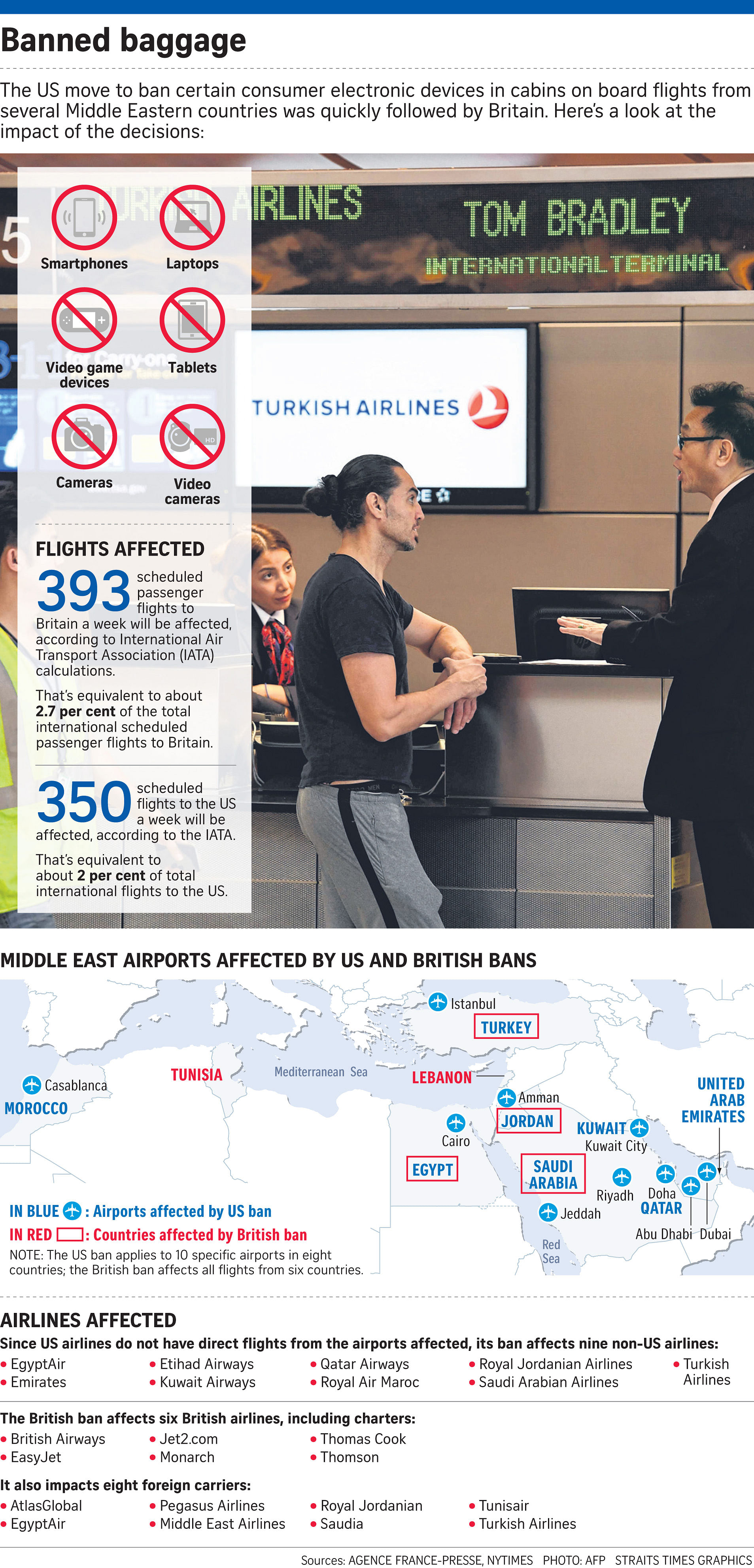In one of the biggest disruptions to the air travel industry since the 9/11 terrorist attacks, Canada and France have joined the chorus of countries seeking to ban travellers from carrying laptops, tablets and other large electronic devices on flights from certain airports in the Middle East, Turkey and North Africa.
The United States and Britain have already initiated such moves, while Singapore is keeping tabs on these developments, which could inconvenience business travellers.
The Singapore Police Force and the Civil Aviation Authority of Singapore are monitoring developments, the agencies told The Straits Times, when asked if Singapore might change its flight security protocol.
Those flying to the US and Britain from the selected airports can carry regular-sized cellphones, but all other devices must be checked in.
Meanwhile, Canada and France are considering similar measures, sparking fears that other countries could follow suit.
The measures are almost certain to deal a huge blow to the big Middle Eastern carriers - Dubai's Emirates, Etihad Airways in Abu Dhabi and Doha-based Qatar Airways.
More than nine in 10 passengers who fly these airlines stop over in Dubai, Doha or Abu Dhabi en route to their final destinations either in the US, Europe or elsewhere. All three hubs are on the US list of 10 airports that the ban applies to.
The ban in Britain affects flights from Turkey, Lebanon, Egypt, Saudi Arabia, Jordan and Tunisia.
Travellers at Changi Airport flying to the US or Britain on airlines that stop at the targeted airports will have to ensure their laptops or other large electronic gadgets are checked in. Otherwise, they risk having their items confiscated.
This could mean factoring in extra time at the airport, said the International Air Transport Association (Iata), the airline body.
According to Iata, the restrictions will impact 393 scheduled passenger flights a week to Britain - about 2.7 per cent of the total international scheduled passenger flights to the country.
About 350 flights a week to the US - or 2 per cent of international flights to it - will be affected.
Since passengers will have to check in their larger devices, there are concerns about fire risk from lithium batteries.
In a statement last night, the International Civil Aviation Organisation, which regulates global commercial aviation, said that incidents involving devices containing lithium batteries may be more easily mitigated in the cabin than in checked baggage.
"Finding an effective balance between safety and security approaches is always a priority in global aviation," it said. It was up to individual countries to strike this balance, it stressed.
The moves by the US and Britain came after a US raid on Al-Qaeda targets in Yemen in January reportedly found that the terrorist group had successfully developed compact, battery bombs that fit inside laptops or other devices.
Believed to be strong enough to bring an aircraft down, the bombs need to be manually triggered.
The Soufan Group, which provides strategic security intelligence services, noted that the restrictions by the US and Britain "demonstrate the difficulties of containing terror groups that continue to use the world's battlefields to refine bomb-making techniques to use against enemies near and far".
Frequent traveller Sim Kok Chwee, 56, who works in the logistics sector, said: "I would avoid all the affected airports. No question about it."
GROWING LIST OF BANNED ITEMS
WASHINGTON • From toothpaste and pocket knives to ink cartridges and scissors, the United States cabin ban on electronic devices on flights from the Middle East and North Africa adds to a long list of products already blacklisted on flights.
9/11: THE TURNING POINT: After hijackers flew passenger jets into the Twin Towers of the World Trade Center in New York on Sept 11, 2001, in-flight security was massively stepped up around the world. All blades, including scissors and pocket knives, were banned from carry-on luggage and relegated to the flight hold. Blunt objects such as baseball bats, truncheons and martial arts instruments were also forbidden, along with imitation firearms.
SHOE BOMBER: On Dec 22, 2001, British national Richard Reid was overpowered on an American Airlines flight from Paris to Miami while trying to detonate explosives hidden in his shoes. Travellers can now be asked to remove their shoes and pass them through an X-ray machine with the rest of their carry-on items.
LIQUID EXPLOSIVES: On Aug 10, 2006, the British authorities announced that they had foiled a terror plot that aimed to blow up several planes in mid-air simultaneously with liquid explosives. Since then, tough restrictions have applied to liquids and gels, including toothpaste. Containers with no more than 100ml of liquid are allowed in the cabin compartment of the plane if they are placed in sealable plastic bags.
RIGGED PRINTERS: Packages destined for the US that contained explosives hidden in printer cartridges and a detonator were intercepted in Dubai and London on Oct 28, 2010. Printer cartridges are now banned from flights, even inside checked luggage, as are all flammable products.
LAPTOPS UNDER SCRUTINY: On Feb 2 last year, an explosion aboard an Airbus A-321 plane operated by Somali-owned Daallo Airlines created a hole about a metre in diameter in the fuselage. Surveillance footage of a terror suspect taken before boarding suggests that he may have hidden the explosives in his laptop. Increased security measures for electronics have already been in place since 2014, and passengers can be asked to turn on their computers and cellphones for verification prior to boarding.
LITHIUM-ION BATTERIES: After multiple in-flight incidents involving lithium-ion batteries that caught fire, they have been subjected to strict restrictions since April last year, and spare batteries are not permitted in the hold.
AGENCE FRANCE-PRESSE



